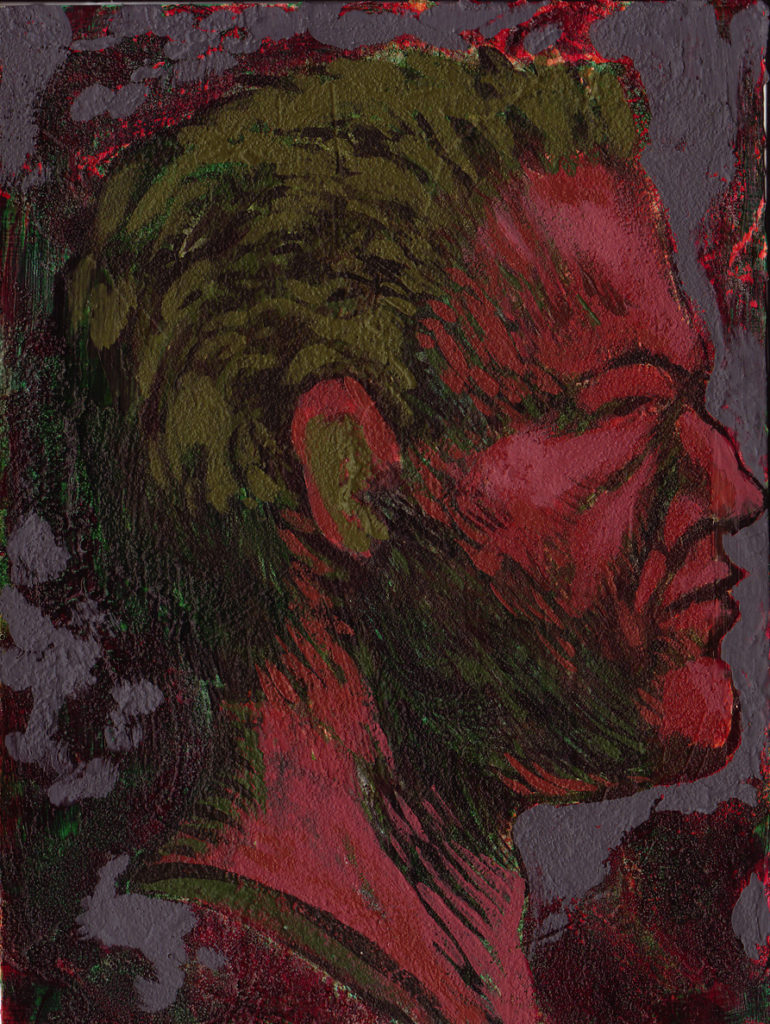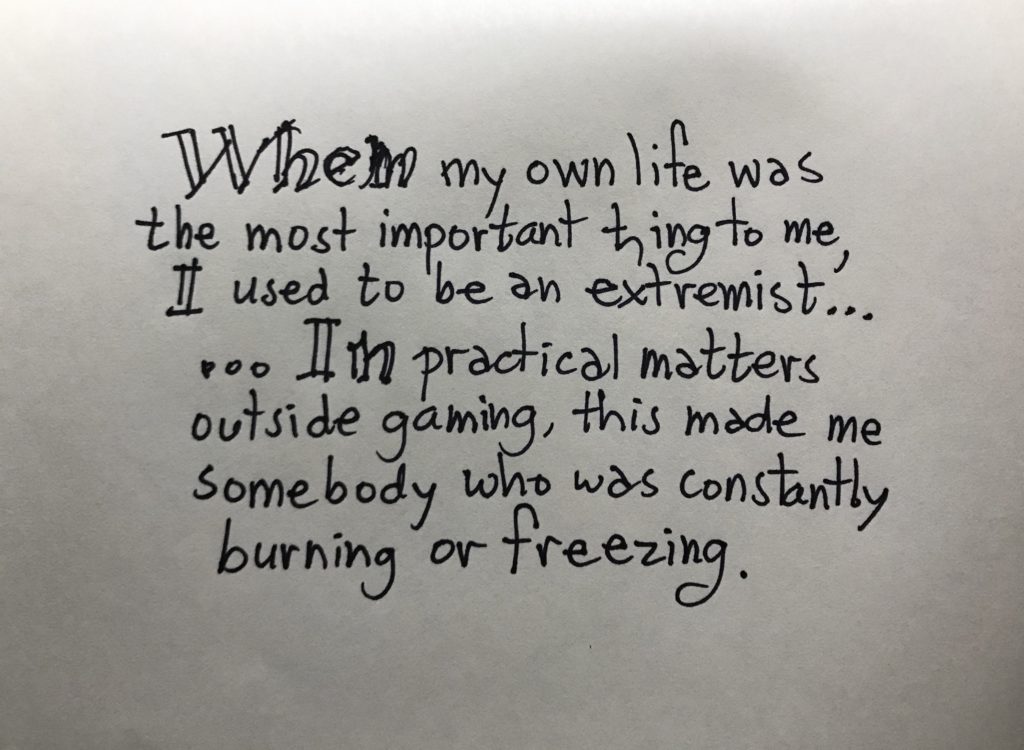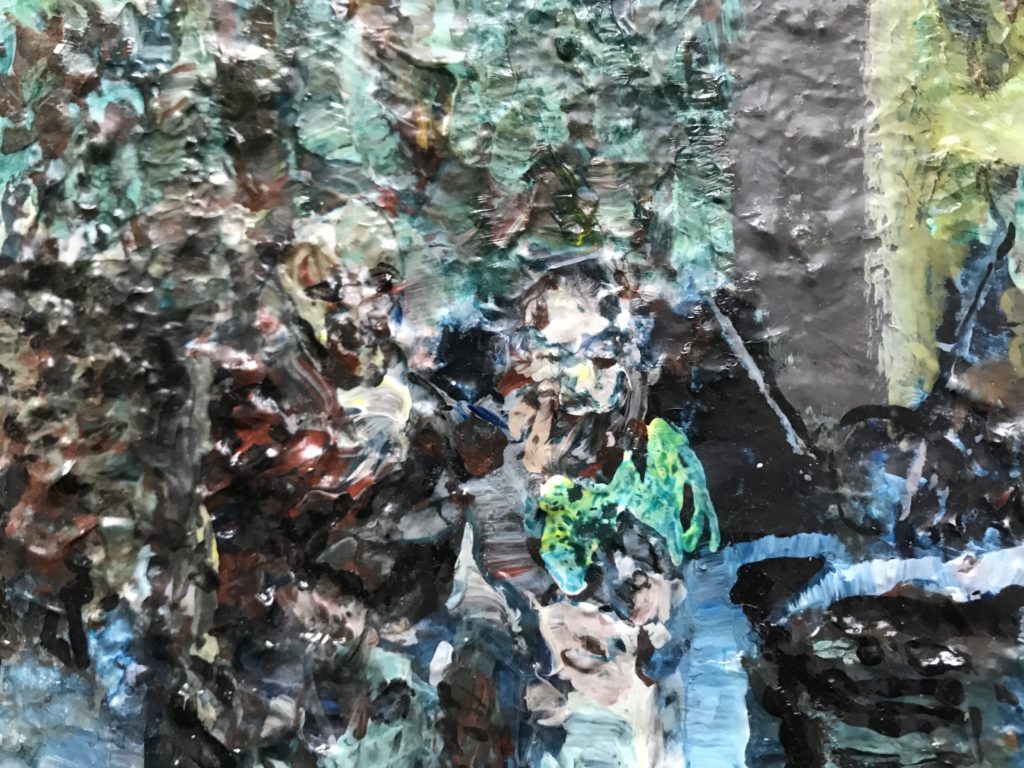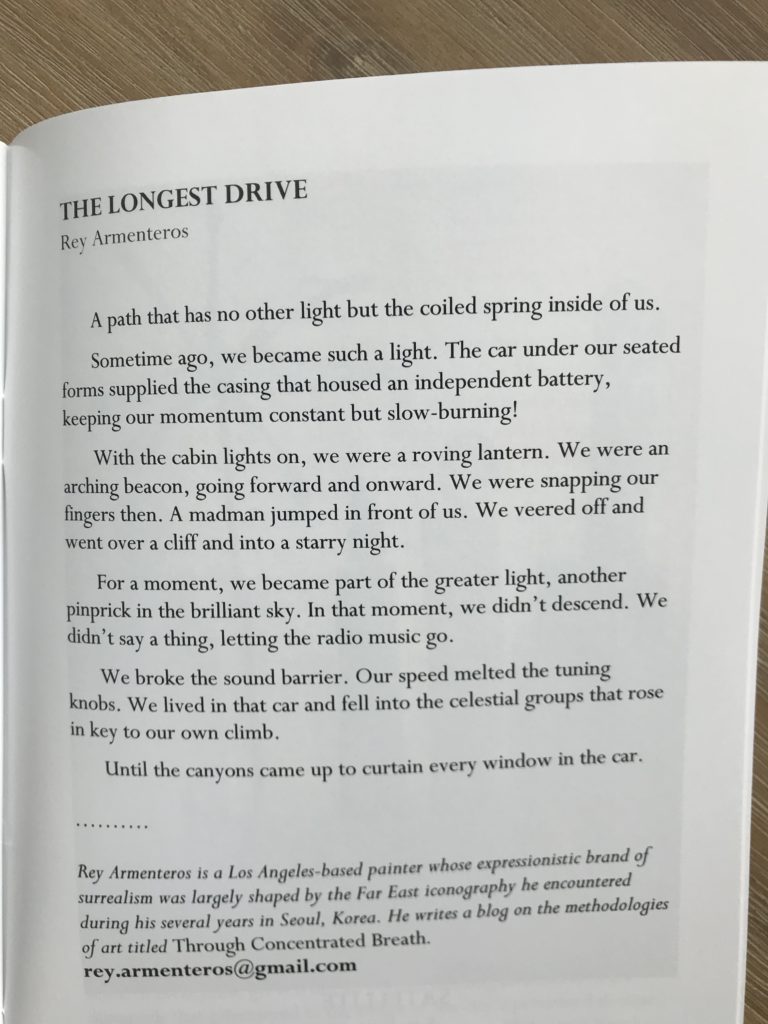01 November 2020
by Rey Armenteros
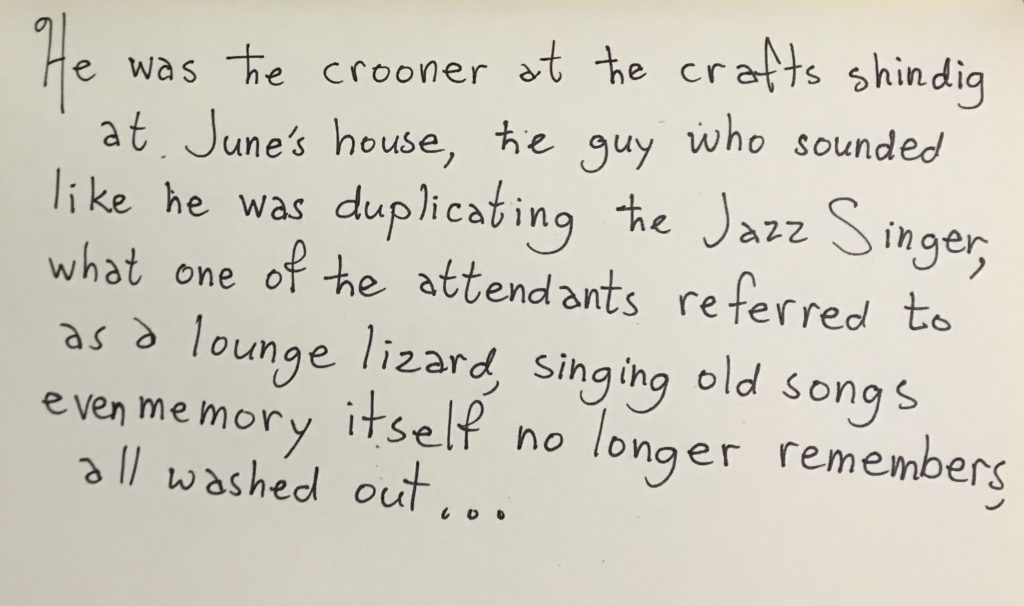
The guy was here, but not permanently. He still had his Florida plates, even after half a year. Was he biding his time, seeing how it was going to turn out for him here? Was he just hedging his bets? I didn’t really care. He was the crooner at the crafts shindig at June’s house, the guy who sounded like he was duplicating the Jazz Singer, what one of the attendants referred to as a lounge lizard, singing old songs even memory itself no longer remembers, all washed out. I met the guy that once, found out he was from my neck of the woods, and I wished him some good luck in making it out here. Then, I bumped into him in the mall a few months later, but we pretended not to know each other. Maybe I looked familiar to him, but I passed him by. I just didn’t want to get into it. Now, I see the guy’s car parked in front of June’s house every morning, still with the same license plate, as if he had one foot turned toward the exit, just in case. Was he living there?
I wanted to ask Carl about him, but Carl was another strange case. He was the friendliest guy in the neighborhood, the guy who knew everybody, the guy who would go out of his way to introduce you to everybody. We were just moved in last year, hardly knew anybody in the neighborhood, and Carl was there to make things right. But he was the type that was too accommodating. I started wondering about him. I mean, he was retired, so the puzzle fit together. He had all the time in the world for you. I knew one thing: people that smile so much come in few varieties. I thought I recognized his smile. It was the type that proposed a certain sociable veneer because he needed it more than anything else in his life. Maybe he was lonely. Being retired could do that to you. But he was healthy and strong. He went to places to get things done for other people, often at minimal cost, even for free. These favors were for old friends he had; these people were all over A_____. The town of A_____ had some lifers that supported each other. It was a tiny city in California that was almost surrounded by the more prosperous C_____. I was just getting to learn about our little city, but you can’t quote me on any of it. I no longer care for local histories.
Carl saw me outside my open garage one morning, cleaning out some boxes. He swung by, and I asked him about the other Miami guy, the lounge singer. He said, “Oh him. He’s still trying to make it out here, but he’s just not making friends. He’s too picky. I was telling him if he wanted to make money, he could, but he had to learn to bend a little. This lady, Jacky, I know who’s well-connected with the city — she was really helping him out, introducing him to the right people, people with connections. She got him a gig with the city. But he wouldn’t listen to her suggestions. If somebody who’s helping you tells you that it might be better to change your music, wouldn’t you think about maybe working with the person, especially since she got you an ad for the show in the paper? That’s big. But he doesn’t want to see it that way. I’ve talked to him about it. He says his music is his, he was going to express himself the way he saw fit. He said it was his art, and that nobody was going to tell him how to do it. Wouldn’t you at least try?”
It’s easy to ask those questions. In all my interactions with Carl, he had always played it off like he was an artist, but not the right type if he believed everything he just said. I don’t know anything about that watered down jazz they used to play in hotel lounges, but an artist who can be made to bend is an artist that can be made to be broken. You have to have spine, or you end up cracked in the middle when people like these well-placed women and men are done with you. You sit there in the dark, looking out a window, wondering if you had done it your way, would it have been different. I don’t agree with him at all, but I was making like I was too busy huffing boxes to give him a proper answer.
Carl lived at June’s, with June and her husband, and I don’t know what their story was. At first, I thought they were related, but they’re not. Why was he living there for so long? I later gathered they needed him to take care of their wheelchair-bound daughter, and that would make sense. I asked him a couple of times, but for as talkative as Carl usually is, he just clammed up and answered with grunts or one-word sentences. It was obviously a touchy subject. I didn’t want to sound too inquisitive, so I left it at that. This other day he showed up at my door unannounced, stopping me from my work in the studio to ask me if I wanted to go out for a cup of coffee, I was thinking of ways of getting rid of him, wondering if I should even open the door. Every time he asked me if I wanted to go out for a cup of coffee, I had always told Carl I was too busy, but he figured I’d change my mind today. I wouldn’t. But I let him in the house, even asked him if he wanted something to drink. We were sitting there at the couch, when one of us edges toward the subject of religion. I didn’t know he was church-going. Twenty years ago, the way the world was heading, you’d think Christianity would be something from the past, but it is stronger than ever now. As forward-moving as my generation sounded back then, we’re going back to what we were, what we had grown up with and had rebelled against, what was familiar. In no uncertain terms, I was telling Carl, I had had it with Christianity, that the only reason my wife takes our daughter to church is so that she could improve her Korean at a Korean Sunday school. If my daughter turned out Christian, I wasn’t going to prevent it, but I certainly was not going to take that path myself. When we were at the door shaking hands and wishing each other a great day, I sensed something in him, as if he sensed something new in me, something that he couldn’t quite work with.
When I first met Carl, I caved in one morning and told him I’d go with him to Starbucks to meet some of his old friends. Carl was trying to introduce me to everyone in those first days in A_____. I did appreciate his enthusiasm, but he was so damn talkative. If the guy was retired, he must have been in his sixties, but he was acting like someone fresh out of high school, recounting all of his great exploits. I thought we were going to talk art, because that was how he had framed the whole thing: “Let’s talk about art!” But he was talking about everything he ever did in his life, regardless if it were not really art, and he never once asked me about where I was coming from. For all he knew, I was a serial killer who dressed in nice shirts and neckties. He didn’t care, as long as he had a pair of ears to get it all and a mouth that only flapped complimentary responses. He needed that like a student going through counseling needed the support. This was not the mind of a man that was in a good place in life. This was someone who didn’t feel good about himself. He had to prove it to others to prove it to himself. He had nothing going, he was always eager to hang out with anyone he could bump into. If you were a retiree, I thought that was the worst place to be because you had nowhere else to go from there. He liked me back then. I could tell. He was always talking to me about everything he did, showing me pictures of school walls he had painted murals on, soccer teams he was coaching, going into June’s house to fetch me some figurine he made back in 1972. That day at the coffee shop with all the other retirees, they were talking about politics, and there were even a couple of reactionary gentlemen espousing the need for the clown who was hijacking the White House at the time. This was not the kind of talk I wanted to get into. When I finally made my goodbyes and I was walking to my car, I promised myself something: I would never step foot in that coffee chain with Carl, even if my life depended on it.
But everybody knew him. When we had our locks changed, the locksmith talked about Carl. When I spoke with someone about his truck, Carl was there to recommend someone for repairs. In essence, Carl was a useful man to have around. He was connected. So, my life may have to depend on it one day, and that was one bridge you probably shouldn’t burn.
Since that religious conversation in my living room, Carl has backed off. He’s still as friendly as ever, but he doesn’t offer anymore personal exploits. He keeps the conversation to the moment: weather and morning plans. I was a great sounding board when he was ripping up the chords of his stories under his air guitar, but that stopped the day I gave him a taste of my opinionated possibilities. Nobody wants to hear what you really have to say. Once they do, they relegate it to not wanting to bend. Although there are others that use what they have to say as a cover for something else, which is what I have always suspected about him. There’s something about him that rubbed me the wrong way since the beginning.
The day we first met him was the Fourth of July when the whole street was cordoned off so the neighborhood families could pop off their fireworks and not worry about outsider cars parking in the neighborhood to see the professional explosions in both cities of C_____ and A_____. He was the neighborhood artist. He was telling us that he was leaving soon, was going to live in Europe. I thought this must have been exciting for him. I wasn’t sure, but he must have been drunk. The next time I bumped into him, I asked him about Europe, and he said that it had to be pushed back. Later, he said he didn’t know when it was going to happen. I stopped asking. After that, it was Thailand, because he owns some land out there, he says. He has a good friend there. He was going to live there for six months. He never went. But every time there was an event, he was the village drunk, slurring his greetings at everyone. I was learning that the friends he had in other countries were all female, and he never made it out to any of those places, even with his apparently romantic aspirations. Then, there was the Korean woman, and she was going back to Korea. And he was going to follow. That was the plan, but it never happened. At the next event, he was drunk again.
It seems like he thrives to chase women around, and he drinks to forget. I don’t think he’s a sexual miscreant or anything like that, but I do think he acts like an adolescent chasing skirts and hollering about his prospects. In Thailand, they call such people butterflies, off after the next flower. He was no more an artist or big traveler than I was a town planner. But he bends backwards to make amends with these women, and from the sounds of it, they don’t want him.
And for a minute, I put myself in his shoes, a guy maybe trying too hard to make something right, somebody with nowhere else to go. Wasn’t I in such a position not too long ago? Or was that sense of the familiar coming back at me because I have a feeling that is where I am going to be heading, because the characteristics that make him that way run parallel to my own?
Really, he just talks too much. Is that a crime? He needs people around him. He has to feel like he’s in the thick of it. He does not talk at all about his personal life. I know he has kids. He never talks about them. He never talks about a past wife or significant other. I just assume he’s divorced. He needs a woman. He’s searching, and he’s hungry for it. His aura confirms this picture. He completes this picture with the body language and the side glances, a piece of commentary that just comes out. But an aura can go deeper, exposing colors beyond that of the visual spectrum to expose feelings, regrets, desires, calculations.
There is a good reason why I can detect it all. How am I able to know so much about someone I hardly ever talk to? Because I was there. Therefore, I am projecting my lesser self onto the structure of his person, not only the way he carries himself but the supernatural odors he’s metaphorically emitting. Could I be wrong about him? There’s a good chance that I am not. We readily recognize those qualities in others that we have successfully hidden in ourselves. If I were not married in this stage in my life, I would be just like him, but less obvious, I believe. He’s tearing up the neighborhood with his friendliness, cuing in everybody on his insecurities and all the rest of the ugly stuff, and I don’t think he even so much as suspects.
But like I said, I could be seeing this because I was there. It could be that many of our neighbors don’t know this about him because they were never that hungry for the same things. They might just think he’s a little strange.
And maybe he’s just being neighborly. That is what it’s supposed to be on the surface. I wish he finds that girl he needs to find and moves on already. He might get busy finally, doing something productive rather than hawking people all the time.
I’m being hard on him. I’ll wipe away every oblique thought I’ve had of the guy and put my trust in him. Outside the bad feeling he gave me at first, he had never given me reason to doubt his intentions. And so, these crossed comments against him are saying more about me than about him. The only thing I can criticize him about is the response to the crooner. Carl having introduced himself to me as an artist, he made me believe that he was one, on some level. And an intrepid artist should know better than to endorse selling out. You can choose to sell out on your own by doing work you think others would like (by bending to public approval), even if in your heart, you do not care for such a direction. I know I have tried that course several times in my life and every single time with the result of failure. But you can never criticize another artist for not doing it. That would just mean you are deeper in the machinery of the flock mentality than the average citizen. Like I’m excusing Carl for every other thing, I am going to excuse him for this, because just like I conclude that he is not a freak or a desperate pervert, I now know beyond all doubt he is not an artist.
When I see the car there with the Florida plate in front of June’s house, I think of the Miami guy. He’s not going to make it out here. He won’t bend. And that means he won’t break because of others, although this is no guarantee against coming to pieces all by yourself.
Leave a comment |
Categories: Memoir, ReyA'
|
Tags: literature, memoir
